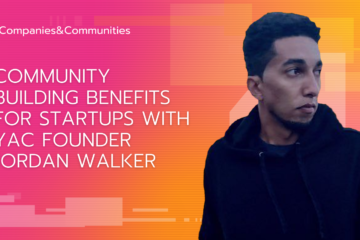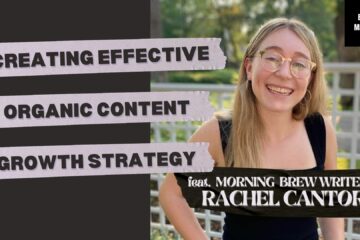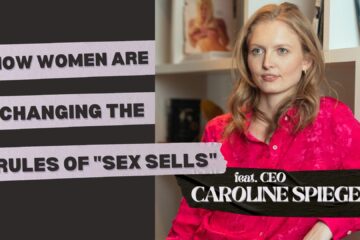
Redefining Marketing Career Success: Interview with Ross Simmonds
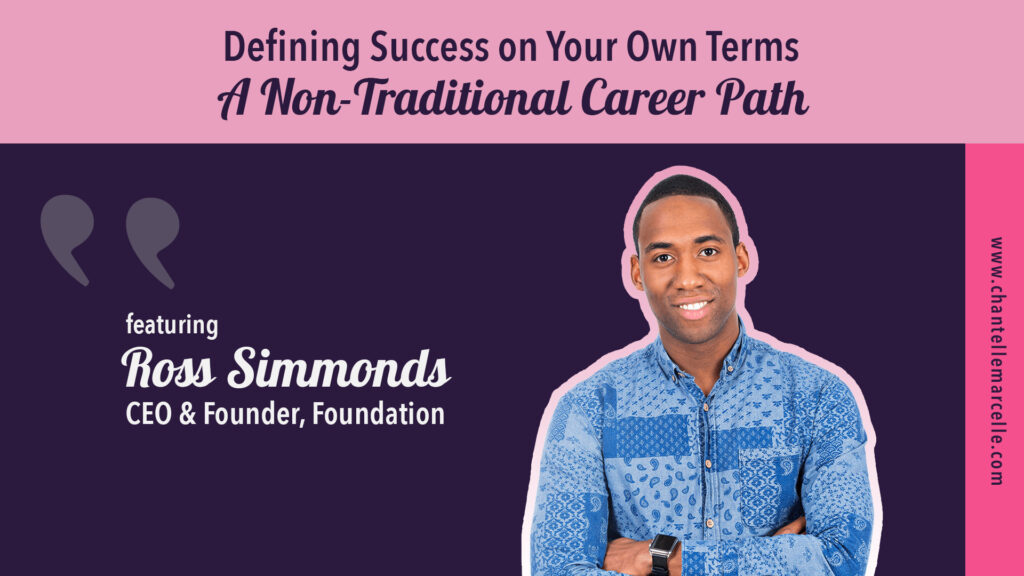
When I was starting my journey into personal branding and connecting with the digital marketing community, one of the first people who caught my eye was Ross Simmonds.
He shared super sharp insights about content distribution that caught my attention. They inspired me to think outside of the box and start speaking up within my own company about the importance of allocating more resources toward distribution rather than just constant content creation.
Over time, I saw how influential Ross’s voice and content were within the marketing community and beyond.
(For example, have you heard of the Sherlock Homeboy content marketing strategy?)
While still in his 20s, Ross built his own company, Foundation Marketing, a content marketing agency that combines data and creativity to develop & serve ambitious brands. Not to mention the other companies he’s founded, including ecommerce brand Hustle & Grind.
[Sign up for my newsletter to get early access to interviews with top marketing experts like Ross Simmonds!]
And his agency and influence only grow faster (for example, he currently has over 15k followers on LinkedIn and over 25k on Twitter).
I finally mustered the courage to ask Ross to share some advice that might benefit the rest of us who are looking at how to carve out our space and establish ourselves.
And not only that, I thought he might be able to share inspiration for those of us looking to define success on our own terms. Success that might not look like the typical corporate ladder climb to the C-Suite.
Is becoming a CMO the only way to rise to the top of the marketing industry? And what does it take to reach the status of CMO for those that are gunning for that position?
Here’s what he had to say.
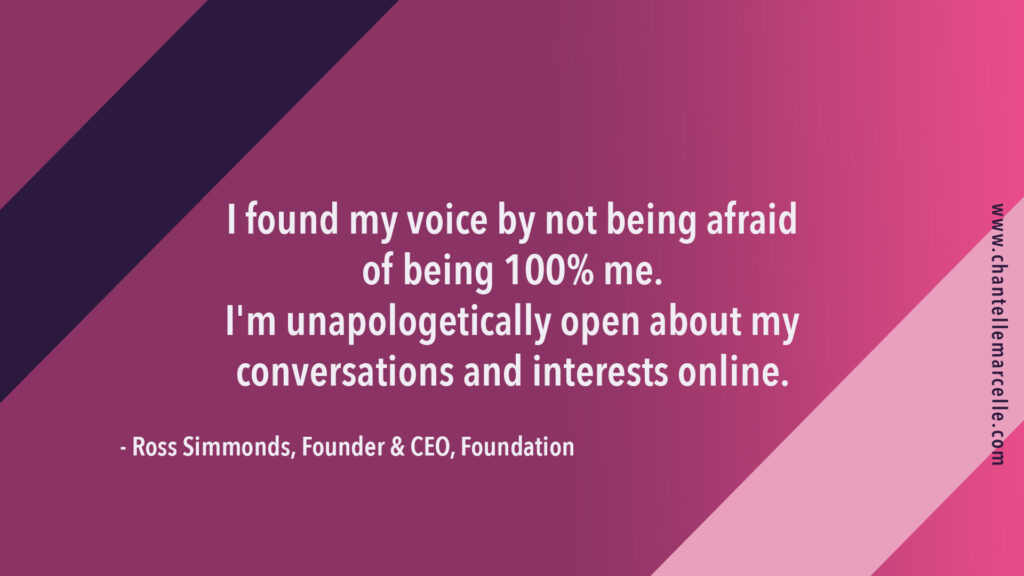
1. You’ve become a leading voice in the marketing community across multiple platforms. How would you describe the voice you’ve cultivated? And how did you “find” your voice?
I would define my voice as staying true to myself and the things I’m passionate about.
I found my voice by not being afraid of being 100% me. I will talk about things that are interesting to me whether it’s Fantasy Sports or Hip Hop, all the way through to SaaS and marketing, and I’m unapologetically open about my conversations and interests online.
And I think that’s what resonates with folks – and the only way I’ve been able to build this voice is to stay consistent with that.
2. You’ve done a tremendous job at positioning yourself as one of the leading experts in the industry on content marketing. What made you focus on this area?
I’ve been a big fan of content marketing since I was a boy. When I first got into the world of marketing, it was kind of accidental. I started a Fantasy Football (FF) blog and created content every single day about a game that I loved, which is American Football. I was writing about who people should start in their FF lineups, and people from all over the world started to take notice and interest in it.
When I started to see this, I realized that this world of content plus internet thing was going to last.
Unfortunately, while the traffic on that blog went up, my marks in University went down, so I quickly had to pivot and focus more on school.
It just so happened that I was studying marketing and I started to put two and two together that the content combo with marketing is something that might last, and I started to write about that.
Over years of working on my craft and creating content about content, people started to take notice and listen. And as a result of consistently creating content and sharing my interest in this space online, folks started to listen and associate the value I was creating with my blog, YouTube videos, tweets, etc. with the content and brand I’ve created.
3. Did you ever consider going the more traditional route of getting an entry-level marketing position and working your way up to CMO? Would you say you ultimately still aspire to be a CMO?
My first job was an internship at the Canadian Broadcasting Corporation, and that job itself wasn’t built around marketing, social media, etc. It was just meant to give me access and exposure into the film and media industry.
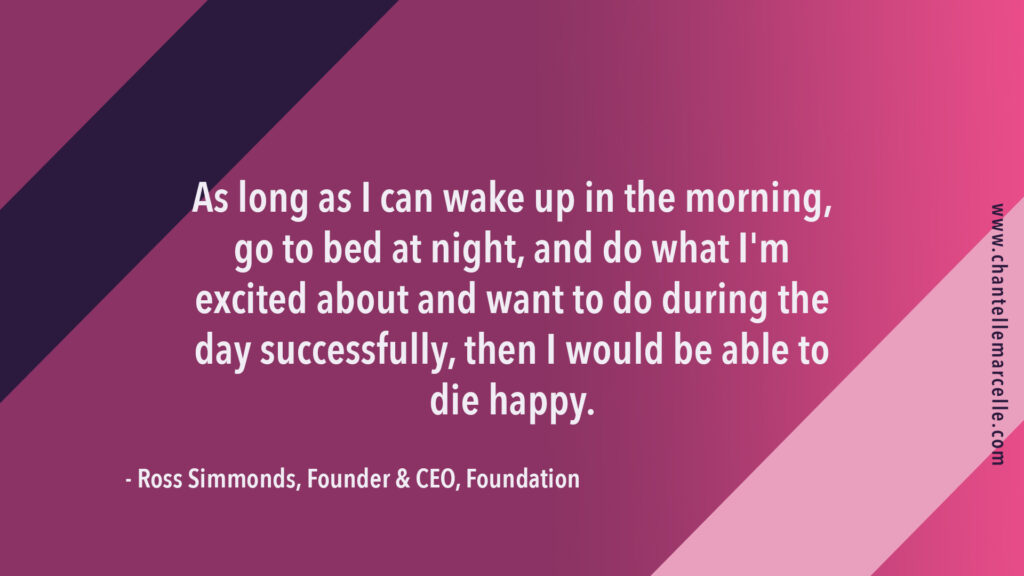
While I was there my passion for social media shone through and I started to develop the social media strategy for the Maritimes, which was my starting point in the industry.
But in the back of my mind, I always knew what I wanted to do, which was to be an entrepreneur.
I’ve always lived by this mantra: that as long as I can wake up in the morning, go to bed at night, and do what I’m excited about and want to do during the day successfully, then I would be able to die happy. And because of that I’ve never had the interest in going down a different path.
I’ve always wanted to be an entrepreneur.
4. Could you give a specific example of a time someone applied to work with you and did a spectacular job at standing out?
I have a colleague who recently applied for a job and went above and beyond by creating a Google Doc that included various examples of work they previously did. It showed how they would manage my inbox and how they would approach all of these various tasks.
And this just stood out because they went the extra mile to show past examples of how they’ve collaborated with others and how they’ve done the job at hand, but also how they would offer that type of collaboration effort by working at Foundation.
In a nutshell, they went above and beyond the typical resume and LinkedIn profile submission and actually showed the type of value they would bring to the company.
And as a result, they work with us now.
5. What’s some simple advice you could give to marketing professionals who feel “stuck” in their career, whether that’s being unemployed or in a position they aren’t particularly inspired by?
Every job that you ever have is going to have elements that you don’t enjoy. Every position is going to have elements that are boring. So you have to get used to, in many ways, the “boring” work.
As much as marketing-Twitter and marketing-LinkedIn may make it seem like this is the most fun, exciting, and sexy job in the world, the truth is there is going to be boring minutes, hours, days, and weeks. That’s just a part of the gig.
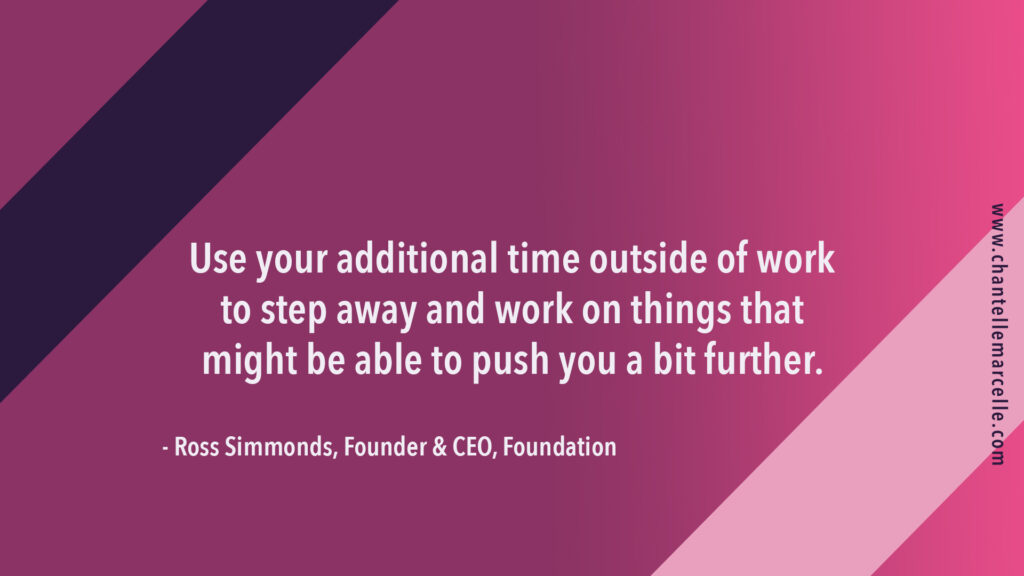
What I would advise folks to do is to use their additional time outside of work to step away and work on things that might be able to push them a bit further.
Find a side hustle.
Find something that is interesting to them, whether it’s running an Instagram account about sports or a certain passion like comics.
Lean into the idea of not only finding fulfillment in your work, but also in the things you do outside of work. And when you do that, you’ll be able to use those things to gain new skills.
When I was writing about Fantasy Sports, I didn’t do it because I thought it would lead to getting a job. I did it because I was excited about it in general, and as a result I was able to fine-tune my craft at writing, learn how to build a website, and how to build a community, and [ultimately] I was able to learn how to build skills that would ultimately carry me down my career path.
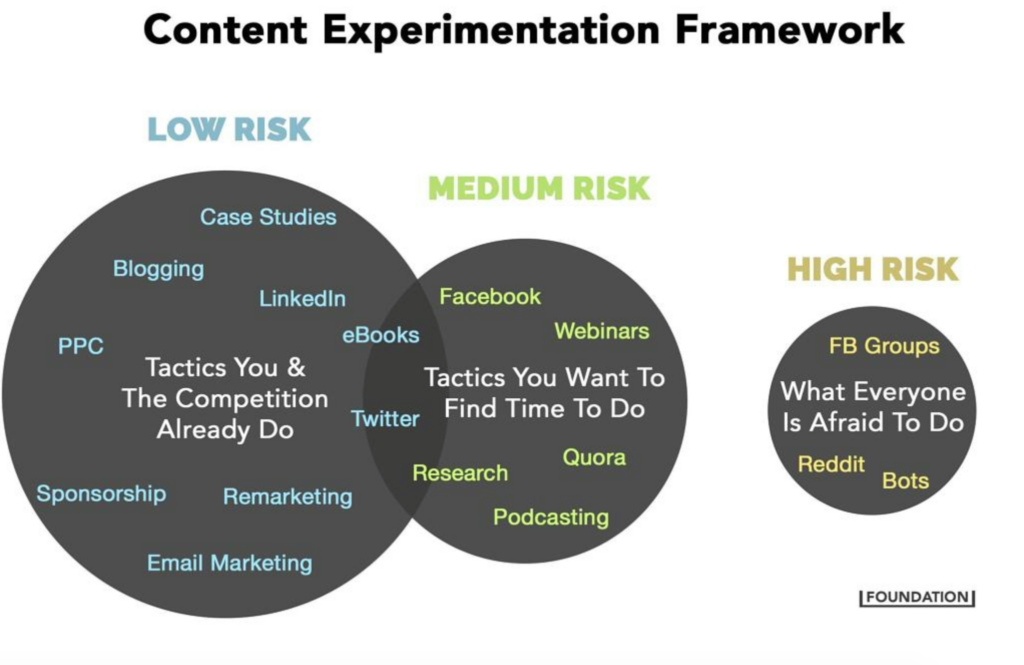
6. A big point of focus is the lack of diversity within marketing, with many people of color and women finding it challenging to get leadership roles at the same frequency.
What do you think can be done to help address those disparities, and what can women and BIPOC marketers do to advance their own careers?
As it relates to empowering BIPOC and women, I think the biggest thing is to “Send the wire or make the hire,” a quote by Tiffani Bell of Human Utility.
And that’s just how simple it is.
If you want to see a difference in leadership positions, hire folks to take on those positions.
If you want to see a shift in the types of folks at the board room table, make the hire to ensure your organization is putting those people at the table.
If you want to make a shift in seeing Black-owned companies do well, send the wire to engage and connect.
Hire those freelancers, agencies, and etc.
You have to make the commitment through either hiring or sending a wire.
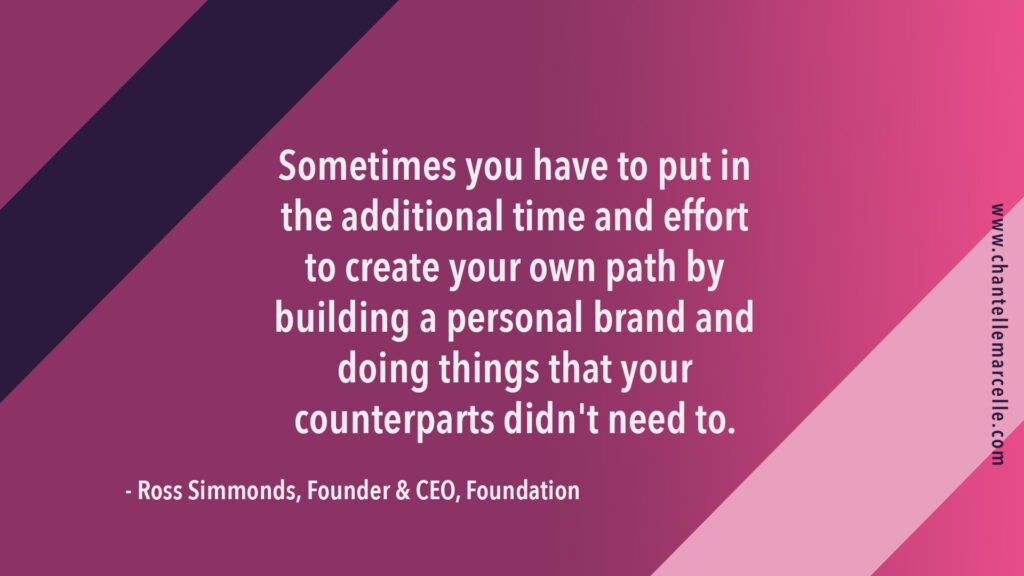
I think it’s often the case that BIPOC marketers have to create their own rope, and while that’s often challenging, that’s the world we live in today where sometimes you have to put in the additional time and effort to create your own path by building a personal brand and doing things that maybe your counterparts didn’t need to.
I always go back to an idea that my parents ingrained in me as a kid that stood out, which is the simple concept of always striving to be twice as talented as they are to get what they’ve had, even if just for once.
This really acted as a defense mechanism moving into the career and business world as I navigate through it.
7. They say one of the hardest parts of being a marketer is marketing your function’s own value to an organization. How have you succeeded in this area?
This is something we’re working on at Foundation every day. We’re rapidly growing, actively recruiting/hiring, acquiring new clients, being pursued by potential clients, and at the end of the day, for us, it comes down to consistency.
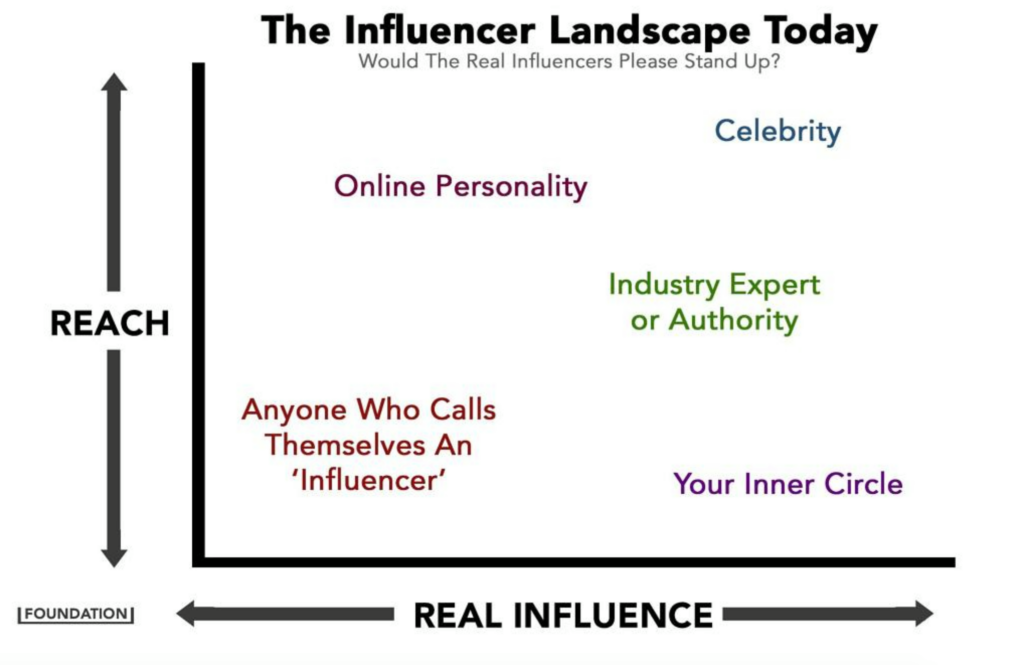
Be consistent in understanding exactly what it is that you value, but also be consistent in talking openly and transparently about those things. You need to own the reality of how you view the world and what you believe and truly embrace as a company, and lean into that fully – and when you do that I feel that the right people who also align with those values are going to start showing up at your door.
8. Do you think the marketing game has changed due to the pandemic? What do you think will be the residual impact to the industry?
In my mind, there is no question that the pandemic has changed the future of marketing. It comes down to two key things:
1. Everyone’s eyes are now open to what is available and possible purely through digital interactions with other humans. So the idea of borders has very quickly evaporated, and we no longer live in just New York, Philadelphia, Nova Scotia, and Toronto.
We live on the internet.
And because of this we can now work with other people who happen to live on the internet.
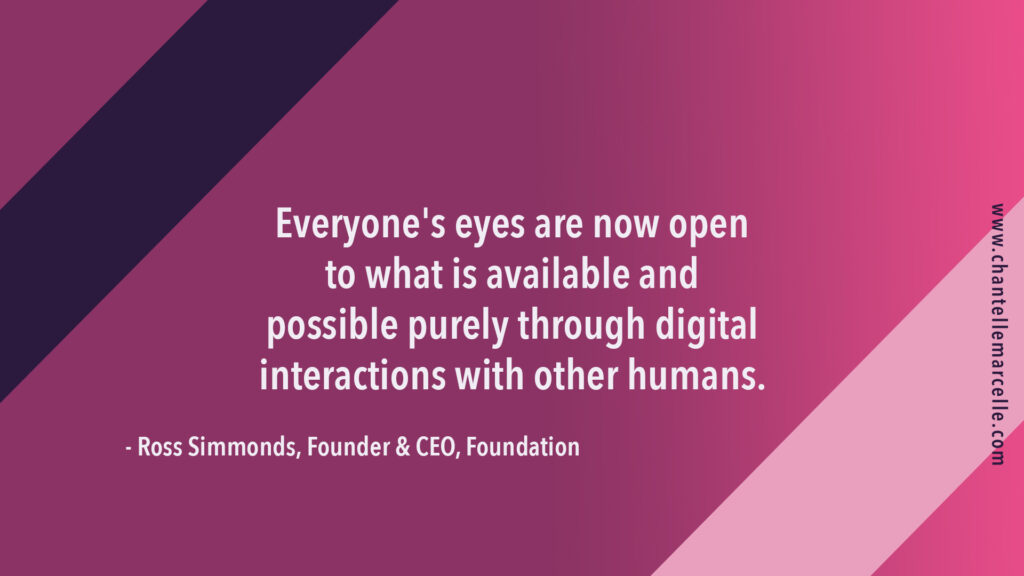
The biggest advantage that the next generation is going to have over anyone else is they’ve gone through a time where they’ve purely been wired in online. Thus they will be a digital native and already know how to build relationships online, through text, asynchronous communication, etc.. So that entire muscle has been developed, and it’s going to strengthen opportunities.
2. I think Clubhouse has opened up the world’s marketing eyes to how many diverse voices are actually out there doing great things in business that have often been overlooked simply because they were not well known.
But when you empower someone to have an equal playing field as it relates to reaching people, there’s no gatekeeper to say who can go to or speak at an event and who can and cannot do XYZ.
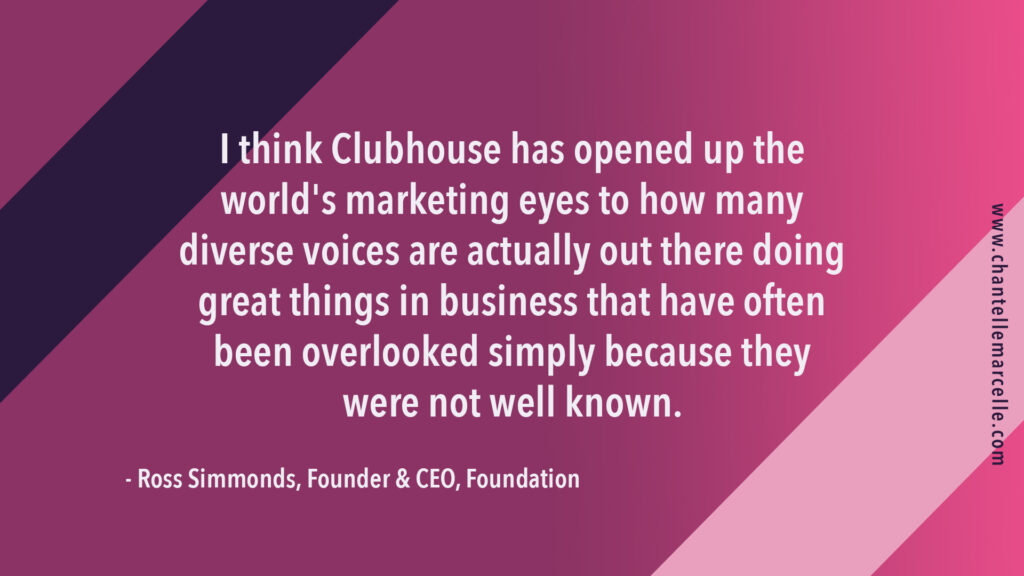
The technology allows for greatness to shine through, and I think we’ve seen that, not only on platforms like Clubhouse, but also Twitter, LinkedIn, and the other channels that have some very well-known names sort of showing up overnight because those gatekeepers are no longer there.
9. How can a marketer tell if they’re “CMO” material?
The best CMO’s are equal parts creative and analytical.
If you’re someone who can get excited about the latest piece of art and can also get excited about learning about a stock that’s skyrocketing and their revenue numbers, PNL, and etc., you’re probably someone who is CMO material.
If you get hyped about only one side of things and aren’t equally as interested in the brand, the story, and understanding your customers, but you’re thrilled about the data, analytics, etc., you’re probably not going to thrive as a CMO because they have the ability to bounce back and forth between both the creative and logical / analytical sides very well.
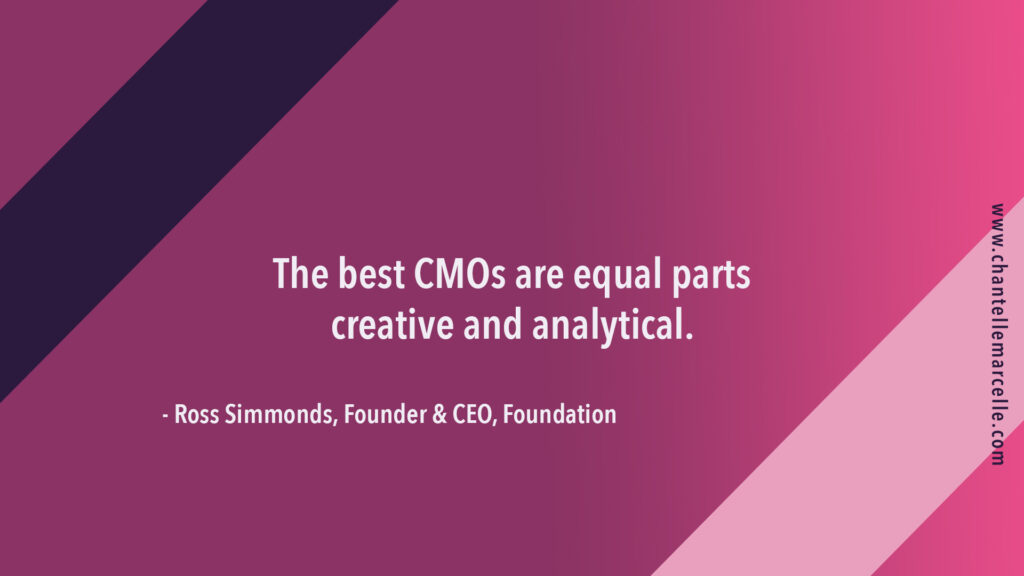
If you can embrace both of those and can use your time with a growth-mindset of trying to improve those muscles, I believe you’re CMO material.
10. Do you have your career mapped out beyond Foundation? How do you set career goals for yourself, and what tips do you have for others looking to do that themselves?
I definitely have career goals myself that are all within Foundation as an organization. This is definitely going to be the organization I’m associated with for a very, very long time. But those career goals are actually the development of others’ careers.
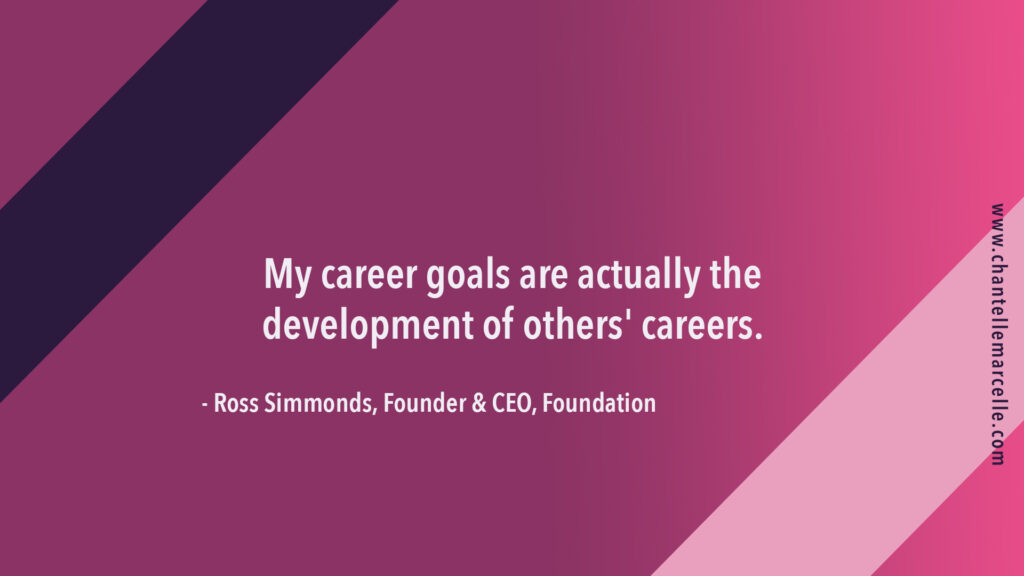
When I look into the future, I can see myself acting as someone who can essentially create a culture where people can thrive and become some of the best executives that this world has ever seen as it relates to marketing, technology, B2B, etc.
My career ambitions are to allow those who work at Foundation to thrive in their own skill sets and their own values to become excellent.
Read another post: Choosing Between Micro vs Macro Influencer Marketing Strategy
Interested in listening to live interviews of marketing experts and executives like Ross on Clubhouse? Get updates and invites here! Or you can also sign up for my newsletter and get fresh insight delivered to you weekly.
